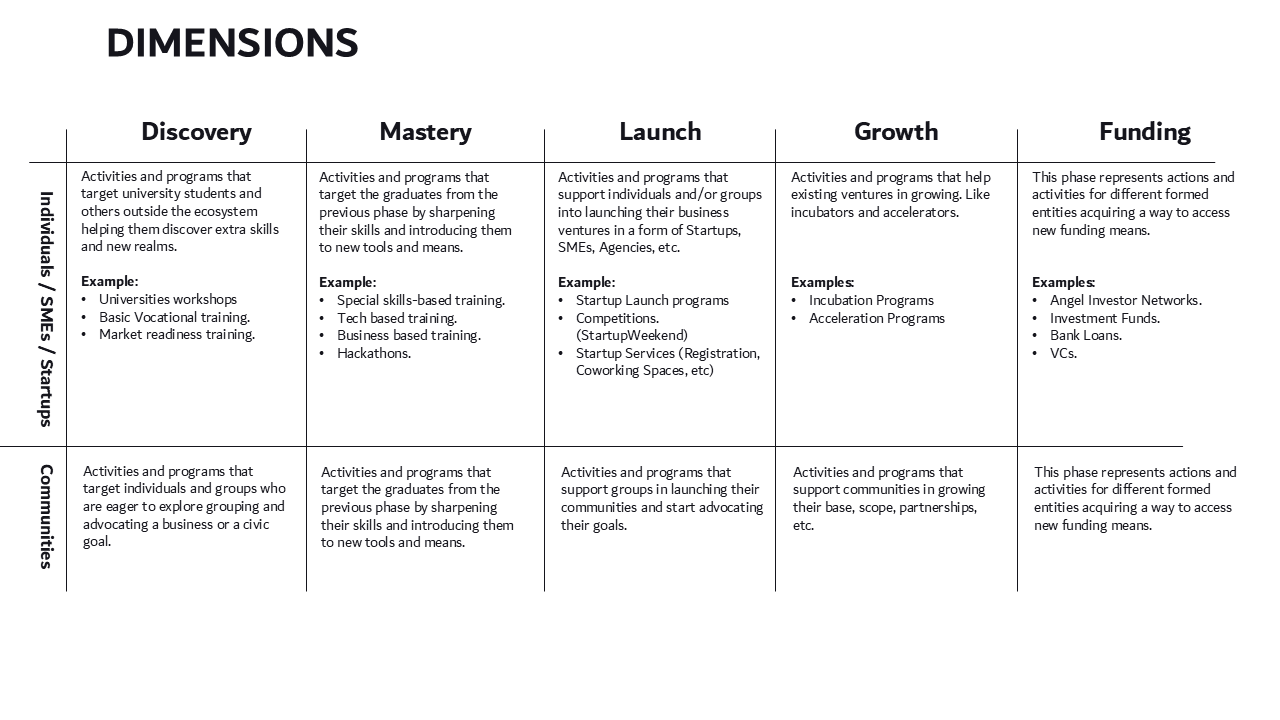THE FRAMEWORK
(Introduction)
The (Resource and Incubation Support for Entrepreneurship) RISE Framework is designed to provide a structured pathway for entrepreneurs and small businesses, guiding them from idea conception to sustainable growth. This framework was created to establish a common language that different entities—such as government bodies, investors, support hubs, and international organizations—can understand and use. It fosters integration and collaboration, enabling these entities to work together seamlessly. By uniting efforts, the framework helps create a robust and productive pipeline for startups and SMEs, ensuring that they receive the necessary tools, knowledge, and resources at every stage. Whether you’re just exploring an idea or seeking capital for expansion, this framework offers the strategic support needed for success within Iraq’s entrepreneurial ecosystem.
THE FRAMEWORK
(Visualization)

THE FRAMEWORK
(Phases in Depth)
Phase 1: Discovery
In the Discovery phase, the focus is on exploration and ideation. Entrepreneurs identify potential opportunities and refine their ideas through programs designed to unlock entrepreneurial potential. Individuals engage in workshops and basic vocational training, gaining foundational knowledge about market readiness and business concepts. This phase is essential for laying the groundwork for further development, helping individuals explore the entrepreneurial journey for the first time.
Key Programs:
- University workshops
- Vocational training
- Market readiness programs
Phase 2: Mastery
The Mastery phase focuses on skill-building and refining business ideas. Entrepreneurs in this phase receive specialized training, honing technical, leadership, and business skills needed to turn ideas into viable plans. Hackathons, technical training, and leadership workshops ensure that individuals are prepared to move forward with confidence. This phase also involves team formation and learning how to execute with the tools necessary for launching a business.
Key Programs:
- Specialized business and technical training
- Team formation and leadership development
- Hackathons and business competitions
Phase 3: Launch
In the Launch phase, entrepreneurs begin formalizing their businesses. This involves registering the company, launching products or services, and securing essential resources like workspace. Startups receive guidance and support through incubation programs and startup services to ensure a smooth entry into the market. Entrepreneurs in this phase turn their ideas into fully operational businesses, supported by tools and resources to establish a firm foundation.
Key Programs:
- Business registration and legal services
- Incubation programs
- Co-working spaces and startup support services
Phase 4: Growth
The Growth phase focuses on scaling up operations. Entrepreneurs work on optimizing business processes, expanding market presence, and forming strategic partnerships. Acceleration programs and mentorship play a key role, helping businesses refine their strategies for expansion. In this phase, startups strengthen customer acquisition strategies and build scalable models to achieve long-term sustainability.
Key Programs:
- Acceleration programs
- Mentorship and business growth advisory
- Market expansion strategies
Phase 5: Funding
The final phase is Funding, where entrepreneurs seek financial resources to fuel further growth. Startups and SMEs gain access to funding avenues such as angel investors, venture capital, and bank loans. Entrepreneurs also learn how to prepare for investment opportunities and secure the capital needed to scale operations and reach broader markets. This phase is crucial for businesses aiming to expand their impact and operations.
Key Programs:
- Angel investor networks
- Venture capital access
- Investment readiness programs
